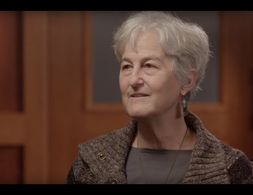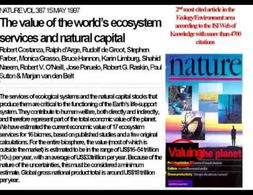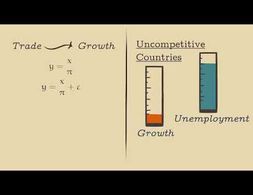✕
214 results
The podcast exposes the concept and principles of co-operatives and the three main types of co-operatives: the consumer, credit and farmers buying and selling co-operatives. Furthermore, the history of the co-operative movement is presented. The authors draw the line from co-operatives to "degrowth" by arguing that these organisations discourage profit maximisation due to their ownership structure, their social purpose and their primacy of people over capital. The value of the members' co-operative share does not increase with the growth of a co-operative and it can not be used for speculation. Finally, the authors give examples for current co-operatives which empower (local) communities fostering social justice and environmentalism.
Michael Kalecki famously remarked “I have found out what economics is; it is the science of confusing stocks with flows”. Stock-Flow Consistent (SFC) models were developed precisely to address this kind of confusion. The basic intuition of SFC models is that the economy is built up as a set of intersecting balance sheets, where transactions between entities are called flows and the value of the assets/liabilities they hold are called stocks. Wages are a flow; bank deposits are a stock, and confusing the two directly is a category error. In this edition of the pluralist showcase I will first describe the logic of SFC models – which is worth exploring in depth – before discussing empirical calibration and applications of the models. Warning that there is a little more maths in this post than usual (i.e. some), but you should be able to skip those parts and still easily get the picture.
The documentary proceeds along the lines of Karl Marx' biography, inquiring into his workings as a journalist, social scientist, revolutionary and historian and his travels through Europe. In chronological order historical events, such as the 1848 revolution or the Paris Commune as well as concepts such as dialectics, the labour theory of value or the reform-revolution debate are revisited. The documentary is narrated by John Kenneth Galbraith and by an actor, who plays Marx and recites quotes from his writings.
In the inspiring interview on Economics of Care, Nancy Foblre takes a closer look to the consequences of the marketization of caring activities on those activities and on the societal organization of care. Folbre elaborates on how to value care and how this shifts the perspectives on living standards. She points to the fact, that caring activities are undervalued both in the market sphere and within the family and thereby questions the division between those spheres. Lastly, Folbre answers the question how to reteach Economics when accounting for caring activities.
Robert Costanza briefly present various methods of environmental valuation, and talks about the changes in the global value of ecosystem services. He then introduces the major ecosystem services, and how different methods of valuation affect the preferred policies to address environmental issues.
Based on a paper by Jason Hickel and Giorgos Kallis Decoupling refers to the separation of economic value creation material extraction and pollution. Ecological limits pose a challenge to growth-led development and the low historical and predicted rate of decoupling suggests that long-term sustainable growth-led development is impossible.
The Austrian School of Economics is an intellectual tradition in economics and political economy dating back to Carl Menger in the late-19th century. Menger stressed the subjective nature of value in the individual decision calculus. Individual choices are indeed made on the margin, but the evaluations of rank ordering of ends sought in the act of choice are subjective to individual chooser.
The third edition of Political Economy: The Contest of Economic Ideas is a fully updated overview of the political economy and its connection with social concerns. This book investigates the main traditions of economic ideas and provides a 'big picture' overview of the analytical tools and value judgements associated with competing schools of economic thought.
The Price of Slavery analyzes Marx's critique of capitalist slavery and its implications for the Caribbean thought of Toussaint Louverture, Henry Christophe, C. L. R. James, Aimé Césaire, Jacques Stephen Alexis, and Suzanne Césaire. Nick Nesbitt assesses the limitations of the literature on capitalism and slavery since Eric Williams in light of Marx's key concept of the social forms of labor, wealth, and value.
The Commentary explains the circular value chain and innovation potential along it. Focusing on Israel, examples on how cross-industry collaboration can help supporting a successful positioning in a (Digital) Circular Economy are presented.
So, what does racism have to do with our 21st century economic system? How can we understand institutions who uphold racism while claiming to value diversity and inclusion? And what does it mean to truly be anti-racist?
Balance of payments stability is of paramount importance for developing countries, both to secure the value of their domestic currencies as well as reliable foreign currency inflows. But how is that stability ensured and how important is the growth of exports for stability?
This fresh and unique textbook provides students and general readers with an introduction to economics from a new and much needed perspective, characterised by its uniquely pluralist, sustainable, progressive and global approach.
Unlike traditional textbooks, Introducing a New Economics contains the key concepts of pluralism, sustainability and justice. It provides students with the central questions covered by economics including resources, work, employment, poverty, inequality, power, capital, markets, money, debt and value.
Deforestation is estimated to be responsible for about 12-29% of global greenhouse gas emissions. This essay will explore ecological economics as an alternative lens through which to approach forest conservation and the acceleration of climate change.
By conducting a discourse analysis (SKAD) in the field of academic economics textbooks, this paper aims at reconstructing frames and identity options offered to undergraduate students relating to the questions ‘Why study economics?’ and ‘Who do I become by studying economics?’. The analysis showed three major frames and respective identity offerings, all of which are contextualized theoretically, with prominent reference to the Foucauldian reflection of the science of Political Economy. Surprisingly, none of them encourages the student to think critically, as could have been expected in a pedagogical context. Taken together, economics textbooks appear as a “total structure of actions brought to bear upon possible action” (Foucault), therefore, as a genuine example of Foucauldian power structures.
What’s inflation? Why is it relevant? And is there an agreed theory about its roots and causes, or is it a contentious concept? That’s what this text is all about: We define what inflation actually means before we delve into the theoretical debate with an interdisciplinary and pluralist approach: What gives rise to it, what factors might influence it, and, consequently, what might be done about it?
Marxian Political Economy focuses on the exploitation of labour by capital. The economy is not conceived as consisting of neutral transactions for exchange and cooperation, but instead as having developed historically out of asymmetric distributions of power, ideology and social conflicts.
Neoclassical economics focuses on the allocation of scarce resources. Economic analysis is mainly concerned with determining the efficient allocation of resources in order to increase welfare.
Economists like to base their theories on individual decision making. Individuals, the idea goes, have their own interests and preferences, and if we don’t include these in our theory we can’t be sure how people will react to changes in their economic circumstances and policy. While there may be social influences, in an important sense the buck stops with individuals. Understanding how individuals process information to come to decisions about their health, wealth and happiness is crucial. You can count me as someone who thinks that on the whole, this is quite a sensible view.
Stratification economics is defined as a systemic and empirically grounded approach to addressing intergroup inequality. Stratification economics integrates economics, sociology and social psychology to distinctively analyze inequality across groups that are socially differentiated, be it by race, ethnicity, gender, caste, sexuality, religion or any other social differentiation.
This is an overview of (possibly transformative) proposals to address the economic consequences of the corona crisis
Mainstream economic narratives notably the concept of comparative advantage trade theory which assumes the equal balance of power between parties are deployed to support the merits of Global Value Chains that the global integration via trade creates mutual gains for both developed and developing countries This narrative is advanced in …
Austrian economics focuses on the economic coordination of individuals in a market economy. Austrian economics emphasises individualism, subjectivism, laissez-faire politics, uncertainty and the role of the entrepreneur, amongst others.
In the history of the social sciences, few individuals have exerted as much influence as has Jeremy Bentham. His attempt to become “the Newton of morals” has left a marked impression upon the methodology and form of analysis that social sciences like economics and political science have chosen as modus operandi.
Feminist economics focuses on the interdependencies of gender relations and the economy. Care work and the partly non-market mediated reproduction sphere are particularly emphasised by feminist economics.
Institutional economics focuses on the role of social institutions in terms of laws or contracts, but also those of social norms and patterns of human behaviour that are connected to the social organisation of production, distribution and consumption in the economy.
Dependency in Central and Eastern Europe - Self-reliance and the need to move beyond economic growth
In this essay, the author takes a critical perspective on the pursuit of growth as the solution for providing for environmental sustainability and economic stability in the countries of Central and Eastern Europe.
Drawing from the framework of dependency theory and presenting brief insights into European core-periphery relations the author then argues for the implementation of an alternative strategy to development that is built around the concept of self-reliance.
How can we establish new institutions and practices in order to use fare-free public transport as a beacon for sustainable mobility and a low-carbon lifestyle? The author of this essay elaborates on how practice theory and institutional economics can help to answer this question.
The outbreak of COVID-19 has substantially accelerated the digitalization of the economy. Yet, this unprecedented growth of digital technology brought novel challenges to the labour market. Rise in income inequalities and precarious working conditions or polarization of jobs. In this essay, we try to assess what tools to use to counter these trends.
Marx’s theory of the falling rate of profit is not only empirically borne out, but the theory he proposed seems to describe accurately how that happens. Furthermore, the whole process is useful for understanding the history of contemporary capitalism.
Exploring Economics, an open-source e-learning platform, giving you the opportunity to discover & study a variety of economic theories, topics, and methods.
As opposed to the conventional over-simplified assumption of self-interested individuals, strong evidence points towards the presence of heterogeneous other-regarding preferences in agents. Incorporating social preferences – specifically, trust and reciprocity - and recognizing the non-constancy of these preferences across individuals can help models better represent the reality.
We use cookies on our website. Click on Accept to help us to make Exploring Economics constantly better!
































